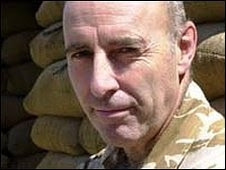
Rescue workers put out the blaze as NATO soldiers stand guard at the scene of a suicide attack in Kabul, Afghanistan on September 8, 2009
By LAWRENCE SELLIN, UPI Outside View Commentator
A nuclear-armed Taliban? It may not be as far-fetched as it might first appear.
The Taliban already control or have a significant presence in northwest Pakistan along a critical stretch of the Afghan border. Taliban units operate with relative impunity in the region surrounding Peshawar, Pakistan's major population, commercial and transportation center less than 100 miles from Pakistan's capital, Islamabad.
Dominance of Taliban and al-Qaida forces in the pivotal northwest region of Pakistan provides not only a sanctuary and training centers for attacks on Afghanistan, but it has become a base of operations to weaken any pro-Western sentiments among the Pakistani people and the government in Islamabad.
Not the least of which are the attacks the Taliban and al-Qaida have mounted against Pakistani nuclear sites in the neighboring province of Punjab. According to an article published in the Long War Journal by Bill Roggio, attacks on the Kamra and Sargodha air bases may have been designed to intimidate officers either on the fence or who do not support the Islamists and erode the military's capacity to defend nuclear installations. The Taliban's control of northwest Pakistan and its strong presence, along with al-Qaida, in Quetta and Baluchistan province in general is a threat to the status quo in both Afghanistan and Pakistan.
If unchecked, an unambiguous Taliban victory in Afghanistan will not only produce mass executions on a scale not seen since the killing fields of Pol Pot's Cambodia and a refugee crisis like Darfur, but it will produce massive political aftershocks and enormously strengthen the hand of radical elements throughout the region. We are only fooling ourselves if we believe that a Taliban-controlled Afghanistan will not become a center for the export of radical Islamic ideology and terrorism.
According to Gen. Stanley McChrystal's recent assessment: "Afghanistan's insurgency is clearly supported from Pakistan. Senior leaders of the major Afghan insurgent groups are based in Pakistan, are linked with al-Qaida and other violent extremist groups and are reported aided by some elements of Pakistan's (intelligence service)."
With a base of operations already existing in western Pakistan, a Taliban victory in Afghanistan will only increase the likelihood of radical elements challenging for control of the Pakistani government. If turmoil breaks out in Pakistan, the United States and its allies may be placed in the unenviable position of securing Pakistani nuclear sites -- at least those of which we are aware. Even without a change in government, a more radical Pakistan may increase the possibility of nuclear proliferation. Case in point is that of radical Pakistani nuclear scientist A.Q. Khan, who allegedly provided critical nuclear secrets to rogue states such as Iran and North Korea or, more ominously, to terrorist groups.
The secondary and tertiary effects of a Taliban victory in Afghanistan should not be underestimated.
Attacks by the Taliban and other radical insurgent groups against Pakistan proper are increasing. According to the National Counterterrorism Center, terrorist operations in Pakistan more than doubled in 2008. Pakistan's present civil unrest and political turmoil is already of concern to India. Any increase of the influence of radical elements within Pakistan could greatly exacerbate tension between them, especially in the aftermath of the November 2008 terrorist attacks in Mumbai. The stability of Pakistan is threatened more by the radical groups within its own territory than by India. Diplomatic steps need to be taken to focus more attention on internal threats than on those Pakistan believes to exist on its eastern border.
Any perceived rout of Western forces and Taliban control of Afghanistan will enhance the position of radical factions in Iran and further demoralize the nascent Iranian democracy movement. It will strengthen Iran's position internationally and create a nuclear-armed belt of instability from India in the east to Iraq in the west. One wonders if the progress that has been made in Iraq could possibly be sustained in the face of defeat in Afghanistan and how it would affect the strategic choices for Israel, which seem increasingly narrow when facing a nuclear-armed Iran with a ballistic missile delivery capability.
The entire region is a volatile mixture of ethnic, religious, tribal, nationalistic and historical grievances dating back 1,000 years. Fragmentation, prolonged conflict and devastating consequences for the people of the region may be in their future, if the present negative trends toward instability across southwest Asia are not contained and those who support it are not confronted. The United States, its allies and the global community can help, but it is primarily the responsibility of the citizens of that region to move their countries away from the brink.
If not, then the so-called restored caliphate envisioned by Osama bin Laden and the premise of his war on civilization may amount to nothing more than a caliphate of chaos, destruction and collapse.

































